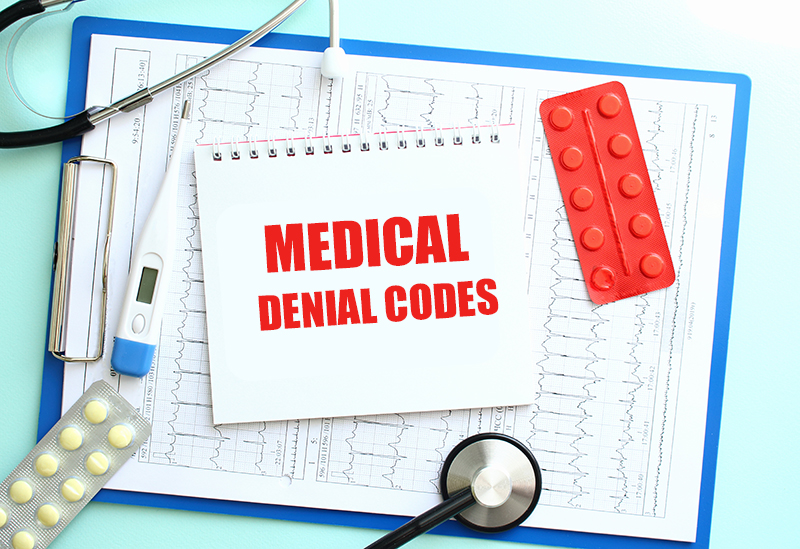Medical claims are the lifeblood of a healthcare organization. Submitting accurate claims is essential to maintain a provider’s financial health. Competent providers of medical billing and coding services help physicians submit error-free claims to maximize revenue and stay in business. However, reports suggest that claim denials are rising. A report from the Kaiser Family Foundation suggests that n-network claims are denied about 18 percent of the time. A December 2020 report by the American Hospital Association (AHA) noted that 89% of hospitals and health systems have seen an increase in claim denials over the past three years, and 51% said the increase was “significant.”
What is a Denied Claim?
AAPC defines a denied claim as one that has been deemed “unpayable.” There are many reasons claims can be denied. The leading causes of denials include insufficient documentation, failing to establish medical necessity, coding and billing errors, coverage stipulations, and untimely filing. Reworking and resubmitting denied claims costs time and money.
When a healthcare insurance company is unable to process a claim, they assign specific codes to it. In order to correct errors and resubmit a claim that has been denied, it is crucial to understand why the claim was denied. Payers will provide an Explanation of Benefits (EOB) or Electronic Remittance Advice (ERA) that explains the reason for the denial. ERAs contain a lot of different codes that cover a variety of statuses for claims. Understanding these denial codes can provide insights into the next steps needed to correctly process the claim, such as identifying missing or unnecessary information.
Maximize your revenue and streamline your healthcare practice with our comprehensive medical billing support.
Top Medical Denial Codes
There are three main categories of claim denials: administrative, clinical, and policy-related. Administrative errors are the most common cause of claim denials, and refer to inconsistencies between the procedure code and the modifier used or missing required modifiers. Correcting these errors is necessary before resubmitting the claim to the insurance payer. Here are some common medical denial codes and actions practices can take when faced with them:
-
- CO-4 – Inconsistent modifier or required modifier is missing: This denial code indicates that a required modifier is missing or that the procedure code is inconsistent with the modifier used.
If you receive denial code CO-4, check if the coding team either used the wrong modifier or forgot to apply it. If the modifier was not applied, correct the mistake and resubmit the claim. To avoid this claim denial, ensure that the modifier used is both required and consistent with the code.
-
- CO-11 – Diagnosis inconsistent with procedure: The diagnosis code should accurately describe the patient’s medical condition and be consistent with the procedures or services provided. Denial code CO 11 often happens due to a coding error where the wrong diagnosis code was used.
If you received denial code CO-11, the first step is to verify if this is the case by checking with the coding department and the patient’s records for any typos or missed diagnoses. If there was an error, correct the claim and resubmit it as a corrected claim. However, if there was no mistake and you disagree with the denial, you can appeal the claim and provide medical records to support the medical necessity of the procedure for the patient’s diagnosis.
-
- CO-15 Missing or Invalid Authorization Number – Certain treatments, medications and services require prior approval from the health plan. Once the plan approves coverage, the prior authorization number must be entered in block number 23 on the CMS-1500 form. Not doing so will result in Missing or Invalid Authorization Number denial.
If a claim is denied for a missing authorization number, check whether your medical billing service provider submitted the prior authorization request. Recheck block number 23 for errors. If pre-authorization details are not available, try to get retro authorization.
-
- CO-16 Service and/or claim lacks necessary information: Denial code CO 16 is typically accompanied by a remarks code, indicating that the claim is either missing crucial information, contains incorrect or invalid information, or has missing or incorrect modifiers. The remarks code will specify the precise information required to rectify the issue.
CO 16 may be caused by various factors, including demographic errors, technical errors, an invalid Clinical Laboratory Improvement Amendments (CLIA) number, or a missing social security number.
When dealing with CO 16 claim denials, review any accompanying remark codes to identify the missing information and make necessary adjustments.
-
- CO-18 Duplicate Service or Claim: Denial code CO-18 occurs when a healthcare provider or their medical billing company submits the same service or claim multiple times to the patient’s insurance company. The insurer will typically process the initial claim received but reject all subsequent claims.
When dealing with a CO-18 claim denial, it’s essential to first contact the insurance provider to identify any duplicate claims and verify the claim’s status. If you’re confident that the claim was submitted only once, you can request the insurer to reprocess it. Alternatively, if there appears to be no reasonable cause for the denial, you can file an appeal.
-
- CO-27 Insurance Expired: Denial code CO-27, also known as “Insurance Expired,” is used when a patient’s health insurance policy has expired, and the healthcare provider attempts to bill the insurance company for services provided after the policy’s expiration date. This code is typically accompanied by a remark code, such as MA130 or N570, to provide more specific information about the denial.
To resolve a CO-27 denial, the patient’s insurance coverage needs to be reinstated. This can be done by contacting the insurance company and renewing the policy. If the insurance company confirms that the policy has been renewed, the healthcare provider can resubmit the claim with the updated insurance information. If the policy cannot be reinstated, the patient will need to pay out of pocket for the services received.
-
- CO-29 Filing Time Limit has Expired: Each health plan has its own claim submission deadline. You will receive denial code CO 29 if you sent a claim after the submission timeframe. To avoid this type of denial, make sure you are knowledgeable about payers’ claim filing deadlines.
You can overturn a CO-29 if you can prove that you submitted that claim within timely filing, yes. Use proof of timely filing to file for an appeal.
-
- CO-167 – Diagnosis is Not Covered: Health insurance plans don’t cover all diagnoses. The payer will use denial code CO 167 when they do not cover the diagnosis or diagnoses. If you face this denial code, review the diagnosis codes reported in the claim.
To address a claim denial with CO 167, you should reach out to the payer to clarify which diagnosis code(s) they do not cover. Once you have identified the problematic code(s), you can then consider whether there are alternative diagnosis codes that could be used. If so, you can resubmit the claim with the updated codes. Alternatively, you may need to bill the patient directly for the services or procedures if they are not covered under their insurance plan.
Denials can impact your bottom line. Partnering with an experienced medical billing company can help you improve your claims management process, reduce denials, and maximize revenue. Experts provide accurate and timely medical billing and coding services for practices of all types and sizes, and improve your revenue cycle efficiency. If you do face denials, they can help you navigate the claim resubmission and appeals process smoothly.
Is your practice struggling with medical billing and coding? We can help!
Call (800) 670 2809 to learn how we can help streamline your RCM process and maximize reimbursement.





